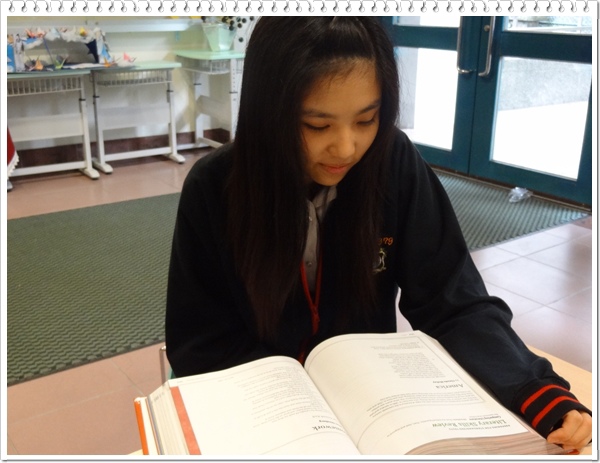背單字對你造成困擾嗎?
如何進行有效率的英文學習?
根據我訪問幾位老師的心得,英文學不好大致可歸納為以下幾個情況:
→→學習情緒低落:這種情緒通常是累積太多的挫折感造成的;而這些挫折感大部分來自於成績低落。到了高中階段,遽增的學習份量,更使得這些挫折感與日俱增,甚至造成學生對學習英文絕望的情緒。
→→將背單字視為英語學習上面最重要、最基本的事情:這種觀念大多是因為在考試當中記不起單字,造成考試失利而來。
看來,背單字著實讓許多孩子在學習英文上遭受挫折。這些孩子的共通點為:
他們都曾經用功努力地背過單字。
他們都曾經鍥而不捨地背單字。
他們都使用「死背」或「硬背」的方式背單字。
他們都在背單字上遭受蠻大的挫折。
如果能有一些訣竅,在英文單字上面產生一些成就感,甚至產生興趣,可望扭轉他們在英語學習方面的困境;至少,可以燃起這些學生在學習英語上面的希望。
此外,若能根據不同程度的學生給予適當的教學內容,也能提生學習興趣與成效。為了達到因材施教的目標,康橋的英文教學採分級授課,適度調配進度與內容,滿足不同程度孩子的學習需求。
曾經在英文單字競賽拿下高分的黎高中生庭如建議,學英文可以從閱讀原文小說及看電影著手。
原本不會的單字在小說或電影中重複出現,多看幾次就會了。我問她,這樣不累嗎?休息娛樂還要學英文,感覺很不有趣。
她搖搖頭說:一點也不,習慣就好。庭如已經養成習慣,只要看到不懂的單字立刻善用手機查詢,並自製單字卡,隨身攜帶。
看到她那一疊疊單字卡,再次印證學習沒有捷徑,持之以恆保持良好習慣,別無他法。


Seven Tips To Learn Vocabulary
最後,分享英文學習的七個小秘訣,快點救救自己的菜英文吧!
•Vocabulary Learning Tip One: Read, Read, Read!
Most vocabulary words are learned from context. The more words you're exposed to, the better vocabulary you will have. While you read, pay close attention to words you don't know. First, try to figure out their meanings from context. Then look the words up. Read and listen to challenging material so that you'll be exposed to many new words.
•Vocabulary Learning Tip Two: Practice, practice, practice.
Learning a word won't help very much if you promptly forget it. Research shows that it takes from 10 to 20 repetitions to really make a word part of your vocabulary. It helps to write the word - both the definition and a sentence you make up using the word - perhaps on an index card that can later be reviewed. As soon as you learn a new word, start using it. Review your index cards periodically to see if you have forgotten any of your new words. Also, do a search on a word using dejanews.com (for searching newsgroups) to get many examples of how the word is actually used.
•Vocabulary Learning Tip Three: Make up as many associations and connections as possible.
Say the word aloud to activate your auditory memory. Relate the word to words you already know. For example, the word GARGANTUAN (very large) has a similar meaning to the words gigantic, huge, large, etc. You could make a sequence: small, medium, large, very large, GARGANTUAN. List as many things as you can that could be considered GARGANTUAN: Godzilla, the circus fat lady, the zit on your nose, etc. Create pictures of the word's meaning that involve strong emotions. Think "the GARGANTUAN creature was going to rip me apart and then eat me!"
•Vocabulary Learning Tip Four: Get in the habit of looking up words you don't know.
If you have a dictionary program on your computer, keep it open and handy. America Online and other internet services have dictionaries and thesauruses on their tool bars. Find them and look up any word you are not absolutely sure of. Use a thesaurus when you write to find the word that fits best.
•Vocabulary Learning Tip Five: Play with words. Play Scrabble, Boggle, and do crossword puzzles.
These and other word games are available for the computer, so you are not dependent on a partner to play. Also, try out the Franklin Electronic Dictionary that features built-in word games.
•Vocabulary Learning Tip Six: Use vocabulary lists.
For the serious vocabulary student, there are many books that focus on the words most commonly found in standardized tests, such as the SAT and GRE. There are also many interesting word sites on the Internet, many of which will send you a word a day by email.
•Vocabulary Learning Tip Seven: Get excited about words!
Come to appreciate the sometimes-subtle differences between them. Do you know the difference between something that denotes something else and something that connotes something else? If not, go look it up. Learn to say what you really mean and discover the joys of being able to express yourself in writing. Your future can depend on how rich your vocabulary is. A good vocabulary will make a difference on the standardized tests, like the SAT and GRE, that could determine whether or where you go to college. It will also determine the quality of your communication. So be in it for the long pull. Let building your vocabulary be a lifelong proposition. Remember: "In the beginning was the word." Until you have a word for something, it does not exist for you. Name it, and you have made your reality richer.




 留言列表
留言列表
 {{ article.title }}
{{ article.title }}